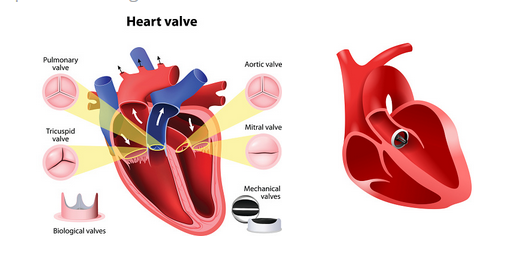What is a heart valve replacement?
Heart valve replacement is a surgical procedure that replaces an aortic or mitral valve that has been damaged by disease or to treat severe congenital heart defects. Heart valves keep blood flowing in one direction through the four chambers of your heart. They open to allow blood to flow forward to the body and close again to stop blood flow back into the heart. Blood doesn’t flow backward because of proteins called chordate tendineae that form chords within the valve structure and hold it tightly in place against its ligaments.
A surgeon may recommend valve replacement if your heart valve is leaking or not working correctly. This can lead to blood flowing backward or in an irregular pattern through your heart and lungs, affecting your overall health and quality of life.
Types of heart valves replacement surgery
There are many different valves used in a heart valve replacement. The valve used depends on the condition and size of your heart as well as your lifestyle. Heart valve replacement surgery best hospitals in India will help you decide which type of prosthesis would be best for you. The main types of heart valve prostheses include:
Animal valve prostheses:-
An effective valve replacement involves the use of tissue valves, also called biological or animal valve prostheses. Animal-based valves are sometimes more advantageous than the more widely accepted man-made artificial valves. The prosthesis itself is made of a special type of tissue that is strong and vital; tissue valves will absorb your blood, nourishing them naturally.
Human valve prostheses
Heart valve prostheses come from human hearts. Your doctor may prescribe one of these valves because you need a new valve in your heart. These valves are different from mechanical valves. Unlike mechanical valves, they are natural and they come from human donors. Human valve prostheses include the following types:
Mechanical valve prostheses
Mechanical valve prostheses are ideal for patients who suffer from damaged heart tissue. Due to the durability, mechanical valves are unlikely to cause any complications. They can be used in almost all patients, with very few exceptions. A person with poor blood flow to vital organs would not be a candidate for a mechanical valve prosthesis.
How is a heart valve replacement performed?
When the heart pumps blood, it travels through four valves within the heart. These valves ensure that blood flows in the right direction. When one or more of those valves does not open or close correctly, it can lead to regurgitation – blood flow backward instead of forward. A valve replacement replaces a damaged valve with a healthy version that opens and closes correctly during each beat.
Heart valve replacement surgery is performed to repair or replace the heart valve that has been damaged by a heart condition. Depending on the type of heart valve disease, one or more heart valves may be replaced. Often, this surgery is performed as a part of multiple valve surgery where two or more heart valves are replaced sometimes at the same time. The three most common types of heart valves needing to be replaced are the aortic valve, mitral valve, and mitral/aortic valves.
Heart valve replacement surgery recommended by your doctor to treat:
If you have damaged or severely narrowed heart valves, a heart valve replacement may be an option to treat your symptoms. A heart valve replacement is a surgical procedure during which your doctor will replace your heart valve with an artificial valve. Heart valve replacements are performed on patients of all ages and include children and infants.
Aortic regurgitation.
The aortic valve opens to allow blood to leave the heart and closes to prevent blood from flowing back into the heart. It is held in place by ligaments attached to the heart wall, and opens with assistance of an electrical signal (an electromechanical coupling) created by an overlapping wave of contraction of the heart muscle lining.
Congenital heart valve disease
Congenital heart valve disease , is a condition that is present at birth. People with congenital heart valve disease have an abnormal connection between the heart’s left and right sides.
Prosthesis replacement
A valve replacement allows blood to flow through your heart and out to your body. Your doctor can prescribe a mechanical or biological valve, depending on your condition and your personal health profile
Who performs a heart valve replacement surgery?
A heart valve replacement may be performed by a cardiac surgeon. Who is an experienced doctor that has completed an extra two-year specialty. He or she has been trained in the surgical treatment of conditions of the heart and its blood vessels.




































